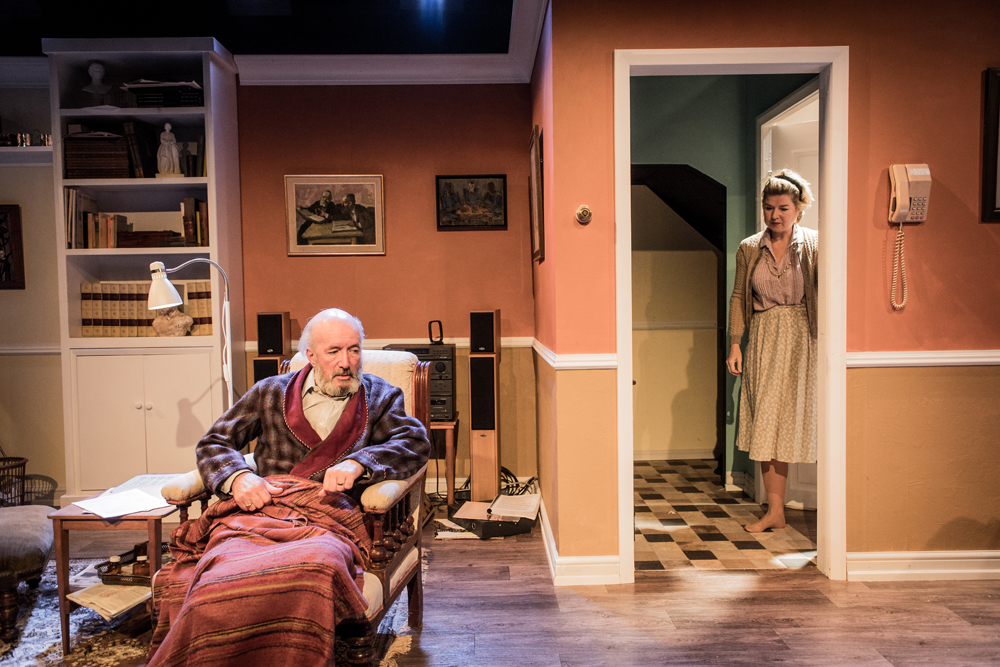 I won’t reveal why novelist Judith Burnley gives her moving debut play this intriguing title. To find out, you’ll have to get to know Otto and Lottie, he a Holocaust survivor and she an aristocratic German with her own story of devastating wartime trauma. Otto’s viola-playing days may be over, as he is also a stroke survivor, but he has the consolation of listening to Brahms on state-of-the-art speakers he designed himself!
I won’t reveal why novelist Judith Burnley gives her moving debut play this intriguing title. To find out, you’ll have to get to know Otto and Lottie, he a Holocaust survivor and she an aristocratic German with her own story of devastating wartime trauma. Otto’s viola-playing days may be over, as he is also a stroke survivor, but he has the consolation of listening to Brahms on state-of-the-art speakers he designed himself!
It’s 1991, so 46 years since the war and two years after the Berlin Wall fell. The latter has repercussions for both; the former changed their lives forever. Escaping Germany in time meant Otto suffered further displacement, interned on the Isle of Man, only to discover the fate of his family once the war was over. Lottie’s father was hanged (‘with piano wire’) for his part in a plot to kill Hitler, and after the war she herself fled life under Communism as Germany was divided.
All this comes out as the unlikely pair size each other up once the life force that is Lottie bursts into Otto’s Belsize Park flat, apparently sent to care for him by his daughter. Lottie explains they met in Israel, where Otto’s daughter now lives and where Lottie’s Israeli partner has just died. Daughter Erika wins him over by describing the traditional Mittel Europa dishes that are Lottie’s cooking credentials – of course it’s Otto we hear reciting, increasingly orgasmically, “Rostbraten? Schnitzel? Sauerbraten?” It’s a hilarious one-sided phone conversation, one of the more successful of a series of such phone chats that stud the action.
Lottie soon discovers Otto has other ways of attempting to reach orgasm – he is in short a transgressive randy old goat, so that by the time he has called Lottie a Nazi and a German shiksa (Yiddish for a non-Jewish whore), your sympathies are with her. And as much as he loves the dishes of his childhood, he despises that icon of Englishness, Christopher Robin. It’s his contemptuous dismissal of her recitations that leads Lottie to reveal that the great love of her life was the English nanny who introduced her to AA Milne.
Nonetheless the pair bond over their love of the English language. For him it means a yearning to fit in, to be part of the country where he’s made a new life, but nonetheless feels like an outsider: “Beneath the politeness … a dirty Jew.” For her it’s her concept that English children played poo sticks as “German children were being conscripted into Hitler’s Youth League."
This is one of the best scenes in a timely play that poignantly explores what it is to be an outsider – reminding contemporary audiences what the refugees of the last century underwent as the asylum seekers of the 21st century strive to make new lives. Clive Merrison and Issy van Randwyck are pitch perfect in this two-handed performance.
By Judi Herman
Anything That Flies runs until Saturday 11 November. 7.30pm (Mon-Sat), 3.30pm (Sat only). From £15. Jermyn Street Theatre, SW1Y 6ST. www.jermynstreettheatre.co.uk


